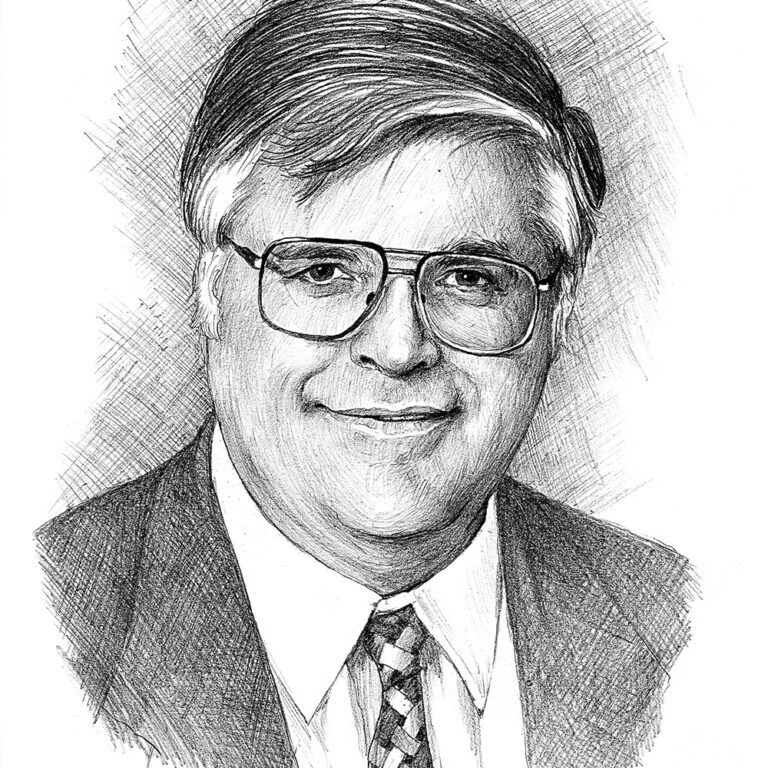

Professor James F. Gusella
King Faisal Prize in Medicine 1997 Laureate
Topic: "Degenerative Diseases of the Nervous System "
I see immense promise in the continued application of molecular genetic techniques to improve the health and well-being of all the world’s populations

James Francis Gusella graduated with a B.Sc. in Biology from the University of Ottawa in 1974 and an M.Sc. in Medical Biophysics from the University of Toronto in 1976. He obtained his Ph.D. (Biology) at Massachusetts Institute of Technology (MIT) in 1980 and has been working at Harvard Medical School at Massachusetts General Hospital since then. He is currently a Professor of Genetics and the Bullard Professor of Neurogenetics at Harvard Medical School and Director of the Center for Human Genetics Research (CHGR) and its Molecular Neurogenetics Unit at Harvard.
Professor Gusella is one of the most distinguished scholars of medical genetics worldwide. He made significant contributions to knowledge of neurodegenerative disorders in general and Huntington’s disease (HD) in particular. Gusella and his coworkers’ focused their research for many years on tracking down the precise cause of HD. Using reverse genetics for mapping the gene locus of HD on chromosome 4, they were able to identify the gene locus which encodes for Huntingtin, a protein associated with HD, and to elucidate the detailed structure of that gene. These discoveries galvanized both the neuroscience and human genetics communities and set off a torrent of similar studies on other disorders. Gusella and his group also applied their genetic mapping approach to many other disorders involving the nervous system.
Professor Gusella and his colleagues have published 292 papers as well as 78 reviews, symposium contributions and chapters in books. He holds several patents, and his accomplishments were recognized by more than 40 prizes and honors. These awards include, the Metropolitan Life Foundation Award for Medical Research in 1987, the National Health Council Award for Medical Research (to the Huntington’s Disease Collaborative Group) in 1993, the J. Allyn Taylor International Prize in Medicine in 1994. Professor Gusella is a fellow or member of major scientific societies and editorial boards and has given numerous lectures at major universities and scientific institutions worldwide.
Professor Gusella and his associates succeeded in mapping the gene locus for Huntington’s disease (BD) on the human chromosome 4. Ten years later he identified the gene locus which encodes for the protein that he called Huntingtin. This seminal discovery enabled him to lead a major collaborative investigation that has culminated in the unraveling of the detailed structure of the HD gene and the expanded CAG repeats that underlie the neurodegenerative changes that characterize this condition. This work has made possible the prenatal and presymptomatic testing of individuals which, in turn, provides the opportunity for genetic counseling in families with a history of BD. Subsequently Professor Gusella and his team were able to identify the chromosomal localization of genes involved in two other neurodegenerative conditions, Alzheimer’s disease (on chromosomes 21 and 14) and familial amyotrophic lateral sclerosis (on chromosome 21).
He and his team are now developing animal models in which to investigate further HD and other hereditary neurodegenerative conditions. In parallel with this pioneering work Professor Gusella has made an outstanding contribution to the training of large numbers of research workers and his laboratory has acquired a unique international reputation as a focus for neurobiological research.
This biography was written in the year the prize was awarded.
- He held several positions including:
- Director of the Harvard Medical School Center for Neurofibromatosis and Allied Disorders.
- Associate Director of the Harvard Medical School-Partners Healthcare Center for Genetics and Genomics.
- Associate Member of the Broad Institute of the Massachusetts Institute of Technology and Harvard.
- He received many awards and honors including:
- Charles A. Dana Award for Pioneering Achievement in Health in 1998.
- Lois Pope LIFE International Research Award in 1999.
- Neuronal Plasticity Award of the IPSEN Foundation in 2004.
- Robert S. Dow Award for Neuroscience in 2004.
- Fellowship of the American Association for the Advancement of Science in 2007.



